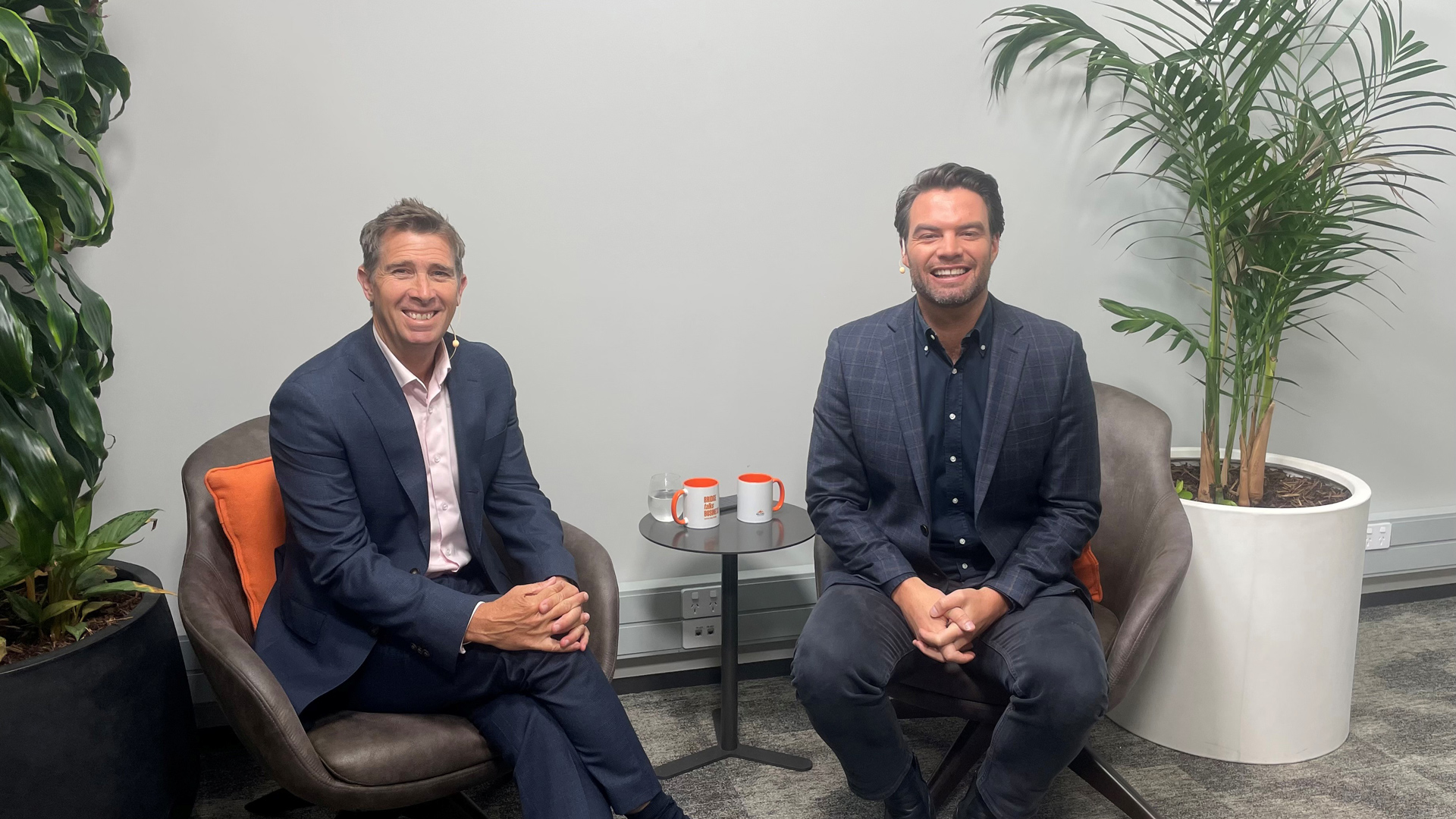The world is full of doomsday merchants predicting the next big market crash. How legitimate are those claims, and do they impact decisions made by investment analysts? Milford Portfolio Manager Mark Riggall debunks the myths and explains the strategies behind informed investment decisions.
Listen.
Listen to the podcast on your favourite platform:
Read.
Bridge talks Business: 8 October 2024
Episode Transcript
Ryan Bridge
Kia ora, I’m Ryan Bridge. Welcome to Episode 9 of Bridge talks Business with Milford. This week we tackle doomsday merchants. You know the ones that reckon that the stock market’s about to collapse, the sky is about to cave in, who should we listen to?
But before that, here’s your top 5 business bits from the past week.
1. The US is breathing a sigh of relief. Stronger activity data and a robust labour market allaying fears there of a slowdown.
2. A rally on the US dollar followed, given the interest rate implications and led to a sharp sell-off of bond prices.
3. Oil prices are up 18% on September lows amid geopolitical tensions in the Middle East, though the market impacts have been limited.
4. Chinese shares are rallying off the back of stimulus there, but no flow on effect yet for China proxies like the Australian resource stocks and European luxury goods – yet.
5. Half a percent, that’s the pick from most local bank economists for our OCR cut this week. The next decision, due November before a summer hiatus for the RBNZ.
If you’ve been anywhere near social media in the past few weeks, you’ve probably seen these predictions. A looming economic disaster, a doomsday for the global financial system. One in particular caught my eye. There is a billionaire investor out of the States who predicted market crashes in 2000 and 2008. He reckons another big crash is coming. The bubble is about to burst, complete with stagflation that’s so bad even the central banks won’t be able to save us.
This week we’re looking at so-called doomsday merchants. What’s fluff? What’s legit? And how did top investment analysts decide what the future holds? Just a reminder, this segment is informational only and should not be considered financial advice.
I’m pleased to have back on the podcast Milford’s Mark Riggall, who is a Portfolio Manager at Milford. Mark, welcome back. Great to have you here.
Mark Riggall
Yeah, great to be here.
Ryan Bridge
Good to see you. Now, this is a little bit of an agony aunt from me, but I’ve been doing a bit of scrolling on social media and I just keep coming across – I know I’m probably in an algorithm now – but I keep coming across these billionaires, these tech moguls, whoever they are, predicting the end of the world, predicting stock market crashes. Do you see this stuff and what do you think when you look at it? Do you pay attention?
Mark Riggall
Yeah, of course we see this. It’s basically our job to look at everything, right? All the inputs that might impact on markets and the investments that we make. So, we are aware of everything that’s going on from valuations through to geopolitics, and actual politics and everything in between. We’re all paying attention to all of this stuff – and we’re all on social media as well. So of course we see the same things that you’re seeing.
Ryan Bridge
So, when I’m freaking out, what are you doing? Because, for example, there’s a guy Jeremy Grantham, who’s a British billionaire. You’ve probably heard of this guy.
Mark Riggall
Yeah. Yeah. I mean, I’ve been following Jeremy Grantham for years. He’s run a fund and he’s been notable for calling bubbles, right? So, his kind of expertise, if you like, is looking at bubbles, right? But by his own admission, seeing a bubble and predicting when it might end, are very different things. And so bubbles take a long time to form and can kind of progress for a while. But actually making money out of that is quite difficult. So, you can’t have an investment process based on just looking at bubbles, right? The GFC clearly was a bubble in housing, dot com a bubble in stocks. You know, these things took a long time to play out and you can make or lose a lot of money along the way. So, how we think about things is to have an investment process, where we take into consideration a whole range of factors, which includes some of these things that you’d be looking at, but also put them in with a melting pot of everything else. And that allows us to create funds and manage funds according to their objectives for the long term and try and smooth out some of these noises along the way.
Ryan Bridge
I mean, if I was in charge of a fund – you just wouldn’t want me in charge of a fund! So, this guy, for example, is talking about after Covid – we had a huge rally in stocks, and he sees that as a potential bubble. Is that something that we should be worried about?
Mark Riggall
Yeah, I mean, I think it’s reasonably fair to say that valuations of stocks in general are quite expensive. We’ve been saying that in our communications with clients. But just because valuations are reasonably expensive doesn’t mean they’re about to go down. What’s the catalyst? What’s going to cause them to go down? There’s good reasons why they’re expensive, right? Policymakers are being very supportive at the moment. We’re getting interest rate cuts around the world. Even China’s embarked on a massive policy stimulus to support their economy. So, there’s good reasons why stocks should be expensive. Earnings growth in the US in particular, and particularly for these technology companies, is really strong. So, stocks are expensive, but they’re expensive for a reason. And that reason could stay present for some time to come.
Ryan Bridge
Another one of the concerns from, this is an American investor, was around stagflation. So, where you have high unemployment, you have high inflation and slow or nothing growth. Is that a risk? Is that something that we should worry about?
Mark Riggall
Yeah, I mean, to a certain extent. We’ve seen stagflation in places like New Zealand. We’ve had very low GDP growth, and yet inflation has remained above where it needs to be. But in the US, for example, you’ve seen the opposite. Inflation’s come down, but growth has remained very, very high. Growth’s kind of 2.5% to 3% in the US. So, different outcomes for different economies, depending on how those economies are structured. The US is very flexible. It responds to changes very quickly. Other places like Europe and New Zealand, less flexible, and so things can be a bit stickier for a while.
Ryan Bridge
So obviously, you have to read a lot in order to formulate these assessments. And I guess to insulate yourself from freaking out like I might about this stuff. Do you have a particular strategy that you follow, or does it depend what fund you might be investing for at any one time?
Mark Riggall
Like you say, depending on what fund you’re investing for, would kind of skew which bits you pay most attention to. So, conservative fund, things that matter for that fund, very different to what might matter for an aggressive fund, which is predominantly in stocks. So, conservative fund is not normally in stock, so you don’t really care so much that valuations are so high. For an aggressive fund, that might be more of a consideration. So definitely, you take into consideration what product you’re managing. The other thing is, it helps to have seen a few of these cycles. And it helps to have seen a few of these announcements and predictions, if you like, from these people. Because if you see them a few times and they don’t play out, it kind of gives you comfort to fade or not get too excited about some of these things.
Ryan Bridge
I guess the other thing is, how often are they making this prediction? You know, as you say, if you’ve seen them do it time and time again and it doesn’t eventuate.
Mark Riggall
Yeah, that’s right. And I think it kind of helps to be healthily cynical, if you hear something, think about why am I hearing it? Who am I hearing it from? If it’s in the news, say, for example, you’re hearing CNBC or even the Herald might be saying – Middle East tensions spilling over. Typically, that’s a reaction to a price change, right? We’ve seen oil prices move a lot. So, when oil prices move, people then go with it – oh, this is a thing. We need to be making these announcements or we need to be covering this in the news. The news is trying to sell advertising, right?
Ryan Bridge
So, this is highly cynical.
Mark Riggall
This does get attention. But by the time it’s on the front page of the news, typically we’ve seen and heard about it, and dealt with it for a period of time before. The other thing is, if it’s a person making a claim on social media, what’s that person’s background? What are they doing? Are they managing a fund that might benefit from things that go wrong? And if they do, then maybe they are on the lookout for things that might go wrong and are kind of always attuned to those things. Even if that might not play out, they’re still looking for those things that can go wrong. So, it does pay to be a bit cynical, if you like.
Ryan Bridge
One of the guys I mentioned, Mark Spitznagel, he apparently runs funds or manages funds that would almost have a conflict of interest in hoping for some kind of crash.
Mark Riggall
He runs funds that people use as insurance. So normally you’re in funds that kind of typically rise over time, but would kind of suffer if there was some volatility event. His fund actually makes money when there’s volatility. It makes money when markets turn south. So, you know, when he’s saying he sees problems, well, you know, his fund’s going to benefit from that and he’s going to get inflows to his funds if those problems start to become more prevalent. So, yeah, I think being a bit cynical about where he’s coming from.
Ryan Bridge
It’s funny because I always thought journalists were the most cynical profession, but I’m quickly learning that you might be taking the cake. What is your outlook then for the global economy for stocks going into the net? We’re kind of coming off that inflation peak in pretty much every country around the world. Interest rates are starting to come down. What is the outlook for stocks?
Mark Riggall
Yeah, so I think we’re in a policy environment. And by policy, I mean both central banks and governments where effectively around the world you’re seeing a willingness to try and let economies run hot. So, they want GDP growth to be firm. What’s allowing them to do that is inflation has come down. So, when inflation was high, you couldn’t lower interest rates because you’re trying to fight inflation. Now it’s come down. Central banks are trying to cut interest rates to support the cycle. So, normally what happens is because interest rates have gone up, the economy would suffer. We’ve seen that in New Zealand, but less so elsewhere, like in the US. And now interest rates are being cut to try and generate a cyclical upswing in the global economy. And places where things were really weak like China, policymakers are going enough is enough. We’re going to do some supportive measures to try and boost things. So, that’s a good environment to invest in. And that gives us optimism that there’s some reasonable returns ahead of us. What tempers that optimism is the fact that by and large asset prices reflect to a certain extent that optimism, ie, as I said before, valuations are somewhat expensive. It doesn’t mean there’s no good shares to buy. But we’ve just got to be a bit more discerning and go hunting a little bit harder to try and find some good companies, where there’s good risk reward in terms of valuation to give us that exposure to the upside.
Ryan Bridge
Nice one, Mark. Thank you very much for that. I feel a lot calmer after talking to you. So, thank you very much for your expertise as always. Great to have you back on the podcast.
Mark Riggall
Good to be here. Thanks very much.
Ryan Bridge
That was Mark, our portfolio manager at Milford, talking about doomsday merchants. Quite an interesting topic, I thought. Next week, we can look forward to Andrew Curtayne from Milford, who’s going to take us through, and Mark alluded to it in his interview this week, oil prices. They’re up 18% from lows in September, this on the back of tensions in the Middle East. What exactly does that mean? Where are they going? How high could they go? And what will it mean for inflation here in New Zealand? Andrew Curtayne will join us for more on that next week. Don’t forget to like, subscribe, to follow, whatever it is you’ve got to do. Comment in the comments section. We would love to hear from you. See you next week.
Missed last week’s episode? Don’t worry! Click here to catch up now.


